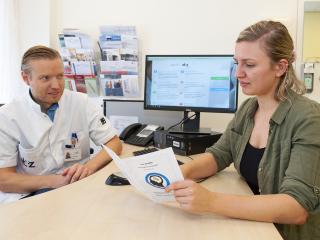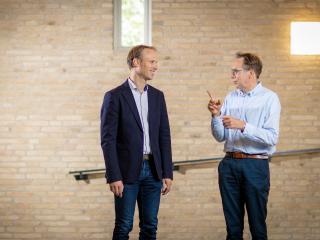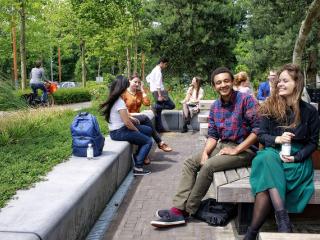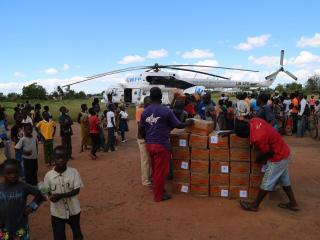Making families less vulnerable thanks to data
Not every child has a good start in life. Poverty, violence, neglect, a deficit in language development; all this has a major impact on later health and social and socio-economic opportunities. Currently, help is often only offered when major problems come to light. How can we stop fighting a running battle?
CentERdata, together with the Data Science Center and the Tilburg University Impact Program, Sterk Huis, and the Region Hart van Brabant in Smart Start, investigates which preventive and joint solutions are needed in which situation. "We want to make children and families less vulnerable and thus prevent problems from arising," says Lian Smits, director at Sterk Huis.
“We often see that the same problems are passed on from generation to generation. Why wait until things go wrong again?”
- Lian Smits
Three research phases
In the first phase, data and knowledge are collected and analyzed to identify risk factors. In this way, the gut feelings of care and education professionals, for example, can be substantiated and objectified.
In the second phase, professionals, the municipality, and parents talk to each other to use design thinking to devise an innovative approach. This is a creative way of arriving at solutions that meet the needs of the target group.
''In the third phase of Smart Start, we evaluate the interventions and see what they yield," explains Patricia Prüfer, principal researcher at CentERdata. "What social effects do the interventions have? Probably qualitative and quantitative analysis. This means that, in addition to the quantitative data, we also use research based on surveys, interviews, and focus groups. ”
What problems are there in primary school
Smart Start works with six pilots spread over three years. The first pilot takes place at primary school in Tilburg. What problems are there and how can the school help parents and children? "Now a multidisciplinary team has been started that teaches teachers which risk factors they should keep an eye on," Prüfer explains. Smits: "That team consists of the internal counsellor, a behavioral coach and a youth employee. All have knowledge of specialist care. Moreover, the team is present at the school about half of the time, which lowers the threshold for parents to ask for help and makes it easier for teachers to sound the alarm."
Higher risks to single mothers
The second pilot in Heusden showed that children of young, single, unemployed mothers have a higher risk of problems. Smits: "What do these mothers need at an early stage to prevent this? Compare it with the positive health approach: if you have a healthy lifestyle and exercise sufficiently, you reduce the risk of certain diseases". Prüfer completes: " It resulted in the idea of making a free sample box with relevant services for single mothers, as compared to maternity subscription boxes. It contains, for example, a coach who helps them with bringing up their children and applying for benefits or who goes through unopened mail with them. At the same time, there is attention for network building."
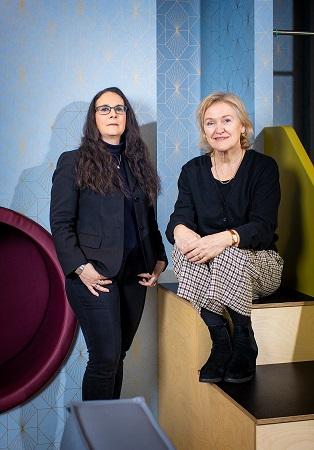
Prüfer completes: "It resulted in the idea of making a free sample box with relevant services for single mothers, as compared to maternity subscription boxes. It contains, for example, a coach who helps them with bringing up their children and applying for benefits or who goes through unopened mail with them.
At the same time, there is attention for network building."
Extra vulnerability when growing up in poverty
The third pilot is at the food bank in Gilze Rijen. "We were able to distinguish five groups of users, two of them with children," says Prüfer. "On the one hand, we saw single parents and, on the other hand, families with serious financial problems." Smits: "We always asked the question: Could we have done something to prevent the current situation? If so, what? And when? We know that children growing up in poverty are vulnerable." Meanwhile, the municipality of Gilze Rijen is working on an intervention aimed at strengthening the autonomy of parents.
How can we prevent a deficit
The fourth pilot in Goirle examines why children start primary school with a deficit. Prüfer: "How can we prevent this? How do we make sure that the families who need it make use of facilities such as early childhood education (Voor- en Vroegschoolse Educatie (VVE))? In addition to the CBS data that we are going to analyze, we will send a questionnaire to all parents in Goirle with children between 0 and 6 years old in order to find out their motives and hurdles."
The Dongen Municipality, the fifth pilot municipality, is currently exploring the research site location and the research question. In addition, a new pilot will start in Tilburg this spring, together with the education authorities.
"The use of data in the social domain is pioneering. The results of Smart Start will lead to a new way of thinking and working," says Prüfer.
How does it work? "We analyze micro-data from Statistics Netherlands (CBS). We then supplement that with data from, for example, the local Municipal Health Service (GGD) whenever possible. We map out patterns and risk factors and then look at how we can help people at district, school, or neighborhood level. Which factors increase risks?”
Data in the social domain
What value does data have in the social domain of the future? "During the project, we were sometimes asked whether it is ethical to use data for solutions to youth issues. If you do it this carefully, I think so," says Prüfer.
Smits nods. "Data analysis should result in positive, preventive help for a group of people. It's also about the goal you want to achieve with it. Think, for example, of children who have become victims of abuse. Later in life, they often say that they knew that people around them felt that something was wrong, but that they did not offer any help. We owe it to these children to offer help in time, before it goes wrong."
Better research in the longer term
CentERdata and Sterk Huis hope to be able to continue with the project even after the research phase of three years. Prüfer: "Preferably you work with a primary school generation because then you can see the long-term consequences: is there less crime, less youth services involved, and less depression? Can we break through generational problems? More money is needed and that is not so easy because we are still at the forefront of the process of change. We are only just researching how we can work together in more preventative manner."
This research is part of the Impact program Creating value from data.
Visit the website: programmasmartstart.nl
Contact
More articles Focus on Impact
Date of publication: 17 March 2020





